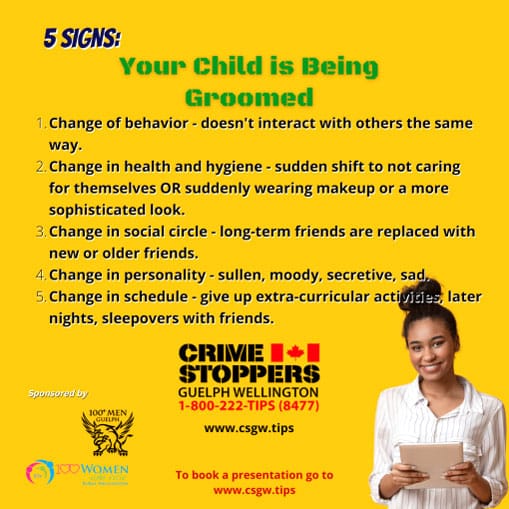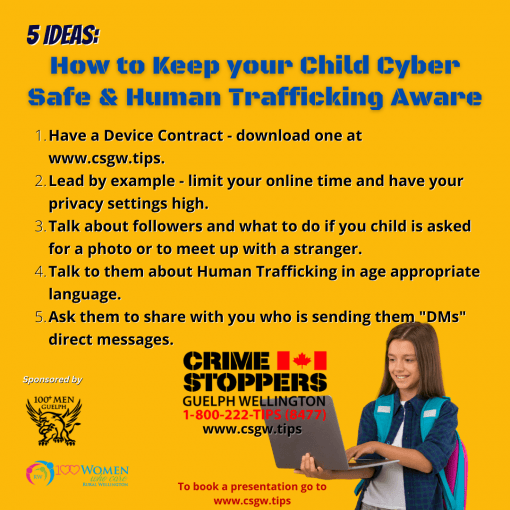MINTO – Crime Stoppers Guelph Wellington (CSGW) coordinator Sarah Bowers Peter shed some light on the dark subjects of human trafficking and hate crimes, transgressions often mistakenly thought of as rare or non-existent in rural areas, during a presentation to town council on Sept. 12.
Bowers-Peter outlined Crime Stopper’s “Five Tips, Five Ideas and Five Signs” program, which was funded through a donation from 100 Women Who Care Rural Wellington.
“This particular initiative we are very proud of because, during the pandemic, we saw more and more that young people were being engaged online,” she told council.
“They were having to spend a lot of time online and parents were not seeing the same things, the patterns that our police investigative partners were seeing, which is predators were reaching out to young people through the internet.”
Bowers-Peter explained the program provides five tips on how to talk to kids about cyber safety and human trafficking, five ideas for parents to keep their children “cyber safe and human trafficking aware,” and five signs that “a child is being groomed.
“It’s just as important now as it was last year when we launched this. And we’ve had a tremendous response to this initiative, and we thank 100 Women for their support,” she added.
The funding allowed CSGW to reach out to parents about the issue through radio, video and print initiatives.
“We know that young people are aware of the grooming that’s happening. When I do student presentations in classrooms, they all know what I’m talking about now when we talk about direct messaging and the way predators engage with them,” said Bowers-Peter.
“It’s the parents that we have to reach out to because they were very much thinking. ‘Well, my child would never…’ – and it’s not about what your child is doing, it’s about what a predator would be doing,” she added.
“I think it’s more important than ever that we keep in touch with our young people and know who they’re talking to online.”
Crime Stoppers has also recently launched a “No Room for Hate” initiative, Bowers-Peter pointed out.
“Again, a lot of people don’t feel that hate crime happens in Wellington County,” she said.
“But I think we know from recent reports and from incidents that have happened nearby that hate crime is absolutely something that happens in small communities as well.”
The campaign aims to increase awareness of what hate crime is, provide support for victims and “encourage people to report it when they are aware of it – anonymously and confidentially, of course, through Crime Stoppers.”
Deputy Mayor Jean Anderson asked Bowers-Peter for more information on how prevalent human trafficking is in the local area.
“I think I’m one of those people that hides my head in the sand and says that doesn’t happen here,” said Anderson.
“I was asked once in a in a public forum … how soon can I assume my child would be exposed to a groomer online? It would be within seconds of them starting an account. It’s been proved repeatedly,” said Bowers-Peter.
She added that predators reach out to young people through all manner of online platforms.
“Basically, any social media platform or online gaming platform that has a direct messaging component is currently being used to engage with young people by predators,” she explained.
“So if it’s Roblox or Minecraft, all of those … people think it’s just social media. It’s not. It’s also online gaming.”

“When I first started talking about human trafficking in 2017, I had a lot of push back, because people thought I was being exploitive and disgusting,” Bowers-Peter recalled.
“Now I go into classrooms, and the kids are like ‘Oh, yeah, I totally know what you’re talking about here … I can show you how many direct messages I have of photos of body parts that are being sent to me because I’m being exposed to this through direct messaging.’”
Bowers-Peter said the problem is “increasing in frequency” due to widespread access to online platforms.
“Back in the day, we would tell young people don’t talk to strangers … if a car pulls over don’t get in the van, if you go to a park, just play with your friends, don’t talk to anybody you don’t know,” she said.
“Kids aren’t going to the park anymore … so we give them a cell phone or a laptop, or a tablet, or some kind of device and, basically, you’re giving them the opportunity to engage with anyone in the world.”
She continued, “That’s why we’re trying to talk to parents as well, because the kids are already aware, because it’s happening to them and there is more engagement at school with curriculum. So now we’re trying to let parents know.
“Don’t think your child is being bad because this is happening to them. It’s a case of it’s happening to all of the kids and I say that sincerely. Most children have received an explicit DM (digital message) from someone wanting them to reciprocate.”
Bowers-Peter noted parents need to be watchful of children starting at a very young age.
“We know of situations in our partnership with Victim Services that children as young as eight years of age have been groomed. And they’ll take years to do it,: she said.
“They aren’t looking for a couple of days to interact with these young people. They’ll take years to do it.”

During the presentation Bowers-Peter asked councillors to consider:
- ways the municipality can help increase awareness of Crime Stoppers;
- is there a local volunteer that could “be a fit” for the CSGW board of directors;
- are there partnerships that could be developed between the municipality and CSGW;
- are there topics CSGW could present to town staff on; and
- are there ways CSGW could assist the municipality.
“And finally, are you following us on social media?” she asked.
“Because we are posting all the time and I really hope you are, because there’s lots of great content that could be shared with your followers as well.”
For more information on the “Five Tips, Five Ideas and Five Signs” or “No Room for Hate” programs, or any of the programs offered by CSGW, visit crimestoppersguelphwellington.com.



